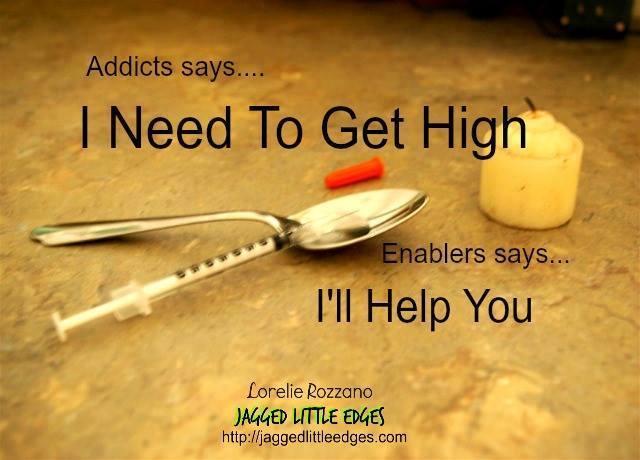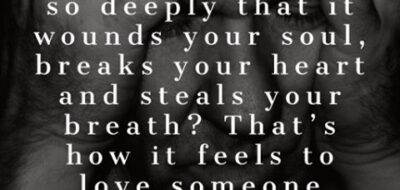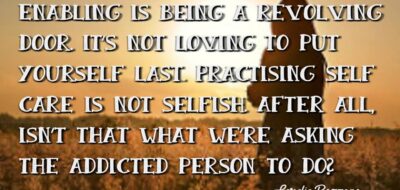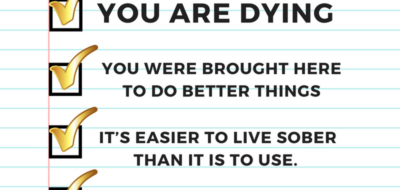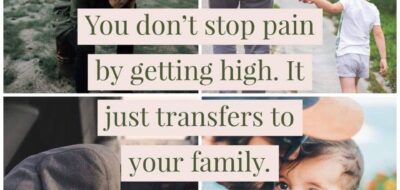Living in, or with addiction, is one hell of a crazy, rollercoaster ride. The emotional ups and downs are enough to make even the most seasoned of sailors, sick. As a little girl growing up with an alcoholic father, I knew something wasn’t right. Nobody ever told me this. I came to that conclusion, as I did everything else in my life, alone. I learned early not to trust people and to rely solely, on me. We never talked about things in our home. In addicted homes you don’t talk, you react.
You can see how this goes horribly wrong. When you’re not living in a healthy or safe environment, communication is not open. Families don’t talk to each other, but rather, interrogate, accuse and blame one another. You need to protect yourself by adopting survival skills. Don’t Talk. Don’t trust. Don’t feel – being the three main ones. To stay safe you must shut down your emotions, and keep the peace. In addicted homes, keeping the peace means helping, protecting, and enabling, the addict.
Addict says I need to get high. They might not use these words, but the message is loud and clear, anyway. The prelude to a using binge often starts with a fight. Then it’s your fault. The addicted person is looking for something/one to pick on, or feel angry about. They will find it, in the most ridiculous situations. A speck of dust, a spilled glass of milk, a late meal, or being asked a question, may cause them to explode. Their mood may be solemn, argumentative, overly critical or rigid. One wrong word can end up in an eruption of verbal violence and emotional bullying. They punish you, with their presence. This passive aggressive behavior is manipulation. What they’re really saying is this – if you want me to stay home with you and not use, you’re going to pay for it. The addicted person is ruled by dishonest thinking. They compare their lives to everyone else, and adopt a poor me, attitude. They’re self-centred and focused on getting their needs met. In conflict, they maximize your actions, while minimizing theirs. The cycle becomes one of tense emotional build up, verbal and emotional abuse, a drinking/drugging binge, followed by a short period of remorse and guilt. The addict’s motto is just one more time.
Enabler says I’ll help. Enabling is a learned behaviour. It’s far easier to give in to the addicted person, than it is to say no and set a boundary. Every family struggling with addiction has a primary enabler. This ‘go to’ person is the one the addicted person seeks out when in trouble, or needing money. The primary enabler feels overly responsible for the sick person and bails them out. They think they know the addicted person, better than anyone else. The enabler may experience a high from helping, or making the sick person, feel better. When the addicted person feels better, they feel better, too. They tend to coddle the addicted person, treating them more as a child, than as an adult. They make excuses for and protect – intolerable and abusive behavior. Enablers are other focused. Their sense of self is defined by what they can do, not who they are. They may falsely believe that by trying harder, they can make the addicted person, well. Control becomes an issue. Their self-worth is tied to the addicted person’s opinion of them. The cycle becomes one of pleasing, walking on eggshells, stuffing feelings and blowing up, followed by long periods of remorse and guilt. Enabler’s avoid these uncomfortable emotions by saying yes to the addicted person’s demands. They enable to feel better – although they may not know it, enabling is a self-serving act. It’s a survival skill and has nothing to do with ‘helping’ the addict. The enabler’s motto is just one more chance.
The addicted person can’t stay sick without the enabler.
The enabler can’t stay sick without the addicted person.
Breaking up this deadly, dysfunctional relationship, is crucial to both parties. Until you become willing to examine yourself and the part you play, no one is going to get better. You can’t do this work when you’re active in addiction, or enabling the addict. Unhooking from each other and reaching outside the family system for individual help, is a must.
As a recovering addict I can tell you, enabling the addicted person is just as deadly, as shooting heroin into their veins.
Living a great life is possible. Recovering from addiction is possible. Chances are your best days haven’t even happened yet. But you can’t do it alone. You have two options. You can keep doing, what you’re doing – and getting what you’re getting. Or you can reach out for help.
The choice is up to you.
Lorelie Rozzano
If you or someone you know needs help, please call this confidential support line for assistance. 1 888 614-2379.
